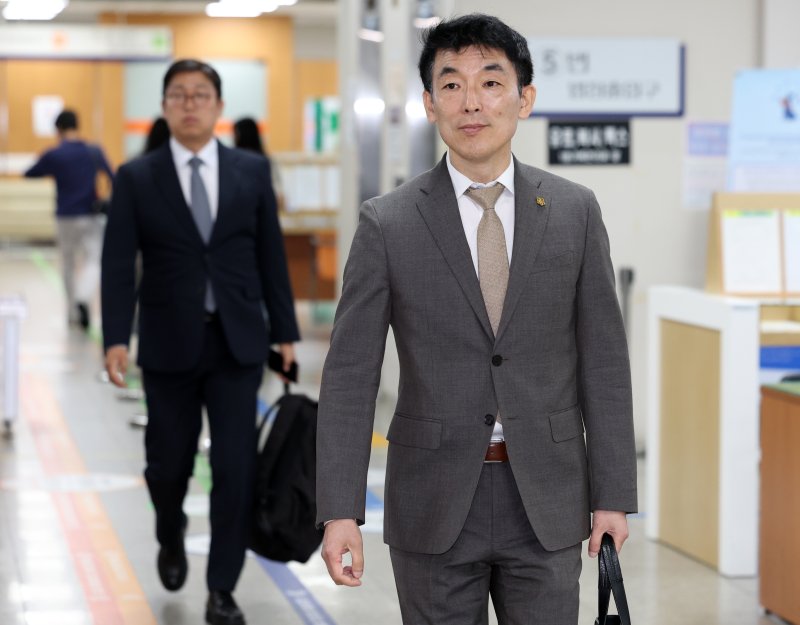'Courtroom Disruption' Attorney Kim Yong-hyun: Confusion in Detention Enforcement...“Need to Enhance Effectiveness of Sanctions”
- Input
- 2025-11-25 14:08:57
- Updated
- 2025-11-25 14:08:57

[Financial News] The repeated courtroom disruptions and controversies over detention involving the defense attorneys of former Minister of National Defense Kim Yong-hyun have sparked calls to strengthen sanctions against violations of courtroom order. The current system for detention for contempt of court is rarely utilized, and enforcement is often undermined by issues such as failure to verify personal information. This highlights the need for more effective enforcement procedures. Some also argue that the system should be improved to allow courts to promptly initiate criminal proceedings for serious violations.
According to the legal community on the 25th, the Criminal Division 33 of the Seoul Central District Court, presided over by Jin Gwan Lee, announced the previous day that it would re-enforce detention for contempt of court against attorneys Ha-Sang Lee and Kwon Woo-hyun, who represent former Minister Kim Yong-hyun, during a trial for a former prime minister. On the 19th, the two attorneys entered the courtroom without visitor passes and refused to comply with the judge’s order to leave, resulting in a detention order. However, during the transfer process to the Seoul Detention Center, enforcement failed because their personal information was not specified in the detention warrant. The court stated it would verify their identities and proceed with re-enforcement.
Detention for contempt of court is an immediate sanction imposed on those who violate courtroom order, but enforcement becomes difficult if the violator refuses to provide personal information. Supreme Court of Korea regulations require that the detention warrant include the violator’s name and address or other identifying information, but if the individual refuses to testify, how to confirm their identity becomes a contentious issue.
Since the detention is executed immediately at the scene, there is little risk of mistakenly detaining the wrong person, according to legal experts. Presiding Judge Jin Gwan Lee also commented the previous day, “Detention for contempt of court is a procedure in which an offender is detained on the spot and transferred to a detention center, much like a person caught in the act. There is little risk of punishing an innocent person, so the requirements for personal information and identity confirmation should be relaxed.” A former presiding judge, now an attorney, added, “As long as identity can be confirmed, enforcement should proceed. It would be odd if a person causing a disturbance in court could avoid enforcement simply by refusing to state their personal information.”
There is also growing support for improving the overall system for maintaining courtroom order. According to a report by the national court security management unit, between 2012 and 2022, there were 965 incidents in courtrooms, including 305 cases (31.6%) of verbal abuse or disturbance, 41 cases (4.2%) of assault or injury, and 11 cases (1.1%) of disobeying orders. Of these, only 98 cases (10.2%) resulted in detention for contempt of court, 56 cases (5.8%) were referred to the police or other authorities, and the majority—249 cases (25.8%)—ended with warnings or being sent home. Jeon Moon-sik, a research officer at the Judicial Policy Research Institute (JPRI), analyzed in a 2023 paper that the procedures for detention for contempt of court are cumbersome and that there is a lack of facilities to hold violators.
There are also calls to establish swift criminal procedures for serious crimes committed in courtrooms. The proposal is to introduce summary procedures for crimes such as contempt of court and obstruction of official duties under the Criminal Act, allowing the court to handle investigations and rulings expeditiously. Former research officer Jeon Moon-sik emphasized the need for improvement, stating, “In practice, when parties or spectators commit serious crimes such as special assault or injury in court, the court should be able to initiate strong criminal proceedings directly, but there is currently no such system.”
scottchoi15@fnnews.com Choi Eun-sol Reporter